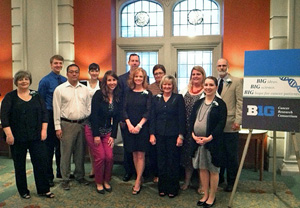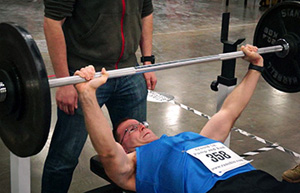Since Christopher A. Fausel, PharmD, MHA, BCOP, was appointed as Chairman of the Board of Directors for Hoosier Cancer Research Network in July 2013, he has guided HCRN through tremendous growth, two moves, and now – a pandemic. He has also helped HCRN raise more than $23,000 through HCRN’s Reps for Research challenge.
From 2014 to 2019, HCRN grew from managing around 15 studies at 130 clinical research sites to more than 80 studies at 450 clinical research sites. Currently, more than 55 sponsor-investigators lead studies within the HCRN network — and other member providers can develop study concepts within HCRN’s Clinical Trial Working Groups in specific cancer areas.
Fausel, oncology precision genomics pharmacist at Indiana University Melvin and Bren Simon Comprehensive Cancer Center, was encouraged to get involved in HCRN in 1998, at the invitation of HCRN co-founder, Patrick J. Loehrer, Sr., MD, distinguished professor at the Indiana University School of Medicine and director of the IU Melvin and Bren Simon Comprehensive Cancer Center.
Back then, HCRN was known as Hoosier Oncology Group or “HOG,” to oncologists and cancer research investigators. Doctors who worked within the Hoosier Oncology Group met in Indianapolis a couple times a year to talk about clinical trial development, with the vision of a cooperative group that would connect academic researchers and community oncologists to develop and offer novel, investigator-initiated cancer clinical trials to patients.
“I was very impressed by the doctors’ ability to speak candidly and brainstorm concepts on developing clinical trials, the back and forth on the feasibility of how certain ideas could be developed into a clinical trial that could actually work,” Fausel said. “It was really an eye-opening experience for a young practitioner and it captured my attention and my imagination.”
Fausel is a licensed pharmacist and his experience working at an academic medical center and at affiliated community oncology outpatient clinics helped prepare him for his role as chairman. He earned a bachelor’s degree and doctorate degree in pharmacy from Albany College of Pharmacy and a Master of Health Administration degree from Simmons College in Boston, Mass. His current focus is working with the Precision Genomics team in helping to identify additional therapeutic options for individual patient cancer treatments based on the results of sequencing patient tumor genomes. He has previously managed the clinical and dispensing pharmacy services at the IUSCCC ambulatory infusion center and six satellite infusion clinics. In the past, he served on IUPUI’s Institutional Review Board and IUSCCC’s Scientific Review Committee as well as participated on an inpatient multidisciplinary patient care team for hematology/oncology and stem cell transplantation patients. Fausel notes that all of these experiences in clinical oncology and operations for inpatient and outpatient cancer services support his decision-making capacity at HCRN.
“I know how hospitals and clinics operate and the challenges they face, so I leverage that knowledge to position HCRN to work in parallel with modern healthcare institutions instead of rubbing up against them,” he recalled. “Anybody that is in a leadership role of an organization like HCRN has to understand our core business and what kind of environmental factors exist that could be headwinds for us doing trials.”
Fausel succeeded Rafat Abonour, MD, as chairman at a time when the Hoosier Oncology Group was recovering from the Great Recession. During this period, the HOG worked closely with IU Health and the IUSCCC to streamline clinical trial design and execution by reducing redundancies and delays.
“Cyndi Burkhardt was relatively new to her role as executive director,” Fausel said. “We were a small operation. There weren’t a lot of clinical trials open at the time. We didn’t know what the future was for HCRN. The Big Ten Cancer Research Consortium was still an abstract idea in Pat Loehrer’s mind. We knew that we wanted to increase our footprint in working with academic medical centers across the country. But we didn’t know if that would happen.”
 Fausel credits Noah M. Hahn, MD, a former chief scientific officer for Hoosier Oncology Group, and now associate professor of medicine in the Department of Oncology and Urology at Johns Hopkins University School of Medicine, for being a chief driver in Big Ten Cancer Research Consortium’s early growth.
Fausel credits Noah M. Hahn, MD, a former chief scientific officer for Hoosier Oncology Group, and now associate professor of medicine in the Department of Oncology and Urology at Johns Hopkins University School of Medicine, for being a chief driver in Big Ten Cancer Research Consortium’s early growth.
“He did a tremendous amount of work in running the groundwork for the success of the Big Ten Cancer Research Consortium,” Fausel said. “We had our first meeting at the American Society of Clinical Oncology annual meeting in Chicago, where all the cancer center directors came from the Big Ten institutions and all of the physicians that are on the Big Ten Steering Committee. Then we had a bunch of people from industry that attending the meeting say, ‘We want to do this. These are the sort of trials we want to have.’ Noah Hahn laid all the groundwork for that.”
After the Big Ten CRC’s first meeting in Chicago, they outlined their vision to focus on early phase cancer clinical trials among the Big Ten academic centers, with correlative research components, and opportunities for mentorship for junior investigators.
“A lot of people understood that was a formula for success in doing clinical trials going forward,” Fausel said.
What helped HCRN and the Big Ten CRC really grow, Fausel said, was the emergence of immunotherapy as a viable treatment for cancer.
“Once the first few immunotherapy drugs got approved, such as pembrolizumab, nivolumab, and atezolizumab, the idea of doing niche, investigator-initiated trials took off,” Fausel said. “Industry folks who developed those drugs thought investigator-initiated trials were an important avenue to discover how well their drugs worked in many different types of cancer, including many rare cancers. Many investigators saw promise in using immunotherapy, either as single agents or as a combination with other agents, to optimize the activity of these drugs. We were able to work with our physician investigators to generate a groundswell of trial proposals and produce written protocols fairly quickly.”
Fausel said investigators, long-term staff, and leadership from HCRN helped the organization grow as a contract research organization through their diligence, attention to detail, and passion for making new early phase cancer clinical trials available.
“Our investigators really stepped up with a lot of different novel ideas for clinical trials and our organization helped them develop these ideas, send them to industry, and get studies funded,” Fausel said. “We’ve learned and refined our processes over decades to get to where we are and to keep performing at a higher level.”
Moving to a new office to facilitate teamwork, increasing capacity of the biorepository, and updating HCRN’s informatics platforms, are just a few improvements HCRN made recently.
He said what makes HCRN great operationally are two things: competence of the staff and responsiveness to physician investigators.
“We try to hit the easy button for physicians when it comes to doing research,” Fausel said. “We support them when it comes to submitting a Letter of Intent, drafting a protocol, and contracting. We have excellent people prepare budgets for physicians, that negotiate these very complex trials between the funder and the university where the physician works. It’s one-stop shopping.”
Fausel said he also appreciates the leadership from Cyndi Burkhardt, RN, HCRN’s executive director, and Shadia Jalal, MD, HCRN’s chief scientific officer, a medical oncologist at Indiana University Melvin and Bren Simon Comprehensive Cancer Center and associate professor of clinical medicine at IU School of Medicine.
“I’ve had the good fortune to have worked with Cyndi since 2013,” Fausel said. “She is one of the key people that helped HCRN get from where we were in 2013 to where we are now. Shadia Jalal is a committed doctor, not only in terms of the care she provides for her patients, but also in ensuring her patients have opportunities to participate in clinical trials. She is an excellent voice for our organization in terms of physician leadership. We are all there to listen to each other, to learn from each other, and to share ideas that will hopefully benefit the organization.”
 One of the highlights for Fausel is raising money for Hoosier Cancer Research Network via the HCRN Reps for Research Challenge. The fundraiser involves donations tied to the number of bench press repetitions he and others would do and would coincide with his participation in the Arnold Sports Festival 5K Pump and Run event in Columbus, Ohio. Last March, Fausel supported Reps for Research and participated in the “Pump and Run” event, just before COVID-19 cases spread broadly. Plans for this year’s Reps for Research are still pending.
One of the highlights for Fausel is raising money for Hoosier Cancer Research Network via the HCRN Reps for Research Challenge. The fundraiser involves donations tied to the number of bench press repetitions he and others would do and would coincide with his participation in the Arnold Sports Festival 5K Pump and Run event in Columbus, Ohio. Last March, Fausel supported Reps for Research and participated in the “Pump and Run” event, just before COVID-19 cases spread broadly. Plans for this year’s Reps for Research are still pending.
While 2020 presented some challenges because of COVID-19, HCRN remains as active as ever in developing and opening new investigator-initiated cancer research.
“We’re getting a lot of excellent proposals from our physician investigators and funders are interested,” Fausel said. “I think physicians, funders, and institutions are looking past this two-year period of the pandemic and to say, we still need to have clinical trials in oncology, so let’s keep our feet on the gas to keep that work going.”
About Hoosier Cancer Research Network:
Hoosier Cancer Research Network (formerly known as Hoosier Oncology Group) conducts innovative cancer research in collaboration with academic and community physicians and scientists across the United States. The organization provides comprehensive clinical trial management and support, from conception through publication. Created in 1984 as a program of the Walther Cancer Institute, Hoosier Cancer Research Network became an independent nonprofit clinical research organization in 2007. Since its founding, Hoosier Cancer Research Network has conducted more than 230 trials in a variety of cancer types and supportive care, resulting in more than 350 publications. More than 9,000 subjects have participated in Hoosier Cancer Research Network clinical trials.

